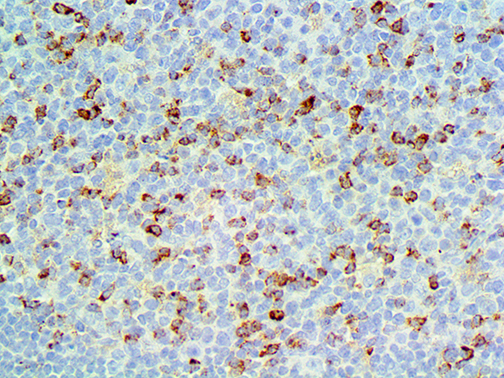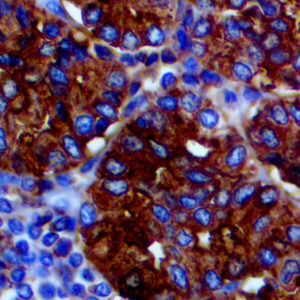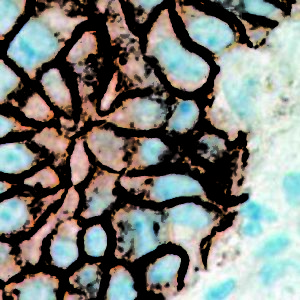
IHC of CTLA-4 / CD152 on an FFPE Tonsil Tissue
| Intended Use | For Analyte Specific Reagent | |||||||||||||||||||||||||||||||||||
| Summary and Explanation | CTLA4 or CTLA-4 (cytotoxic T-lymphocyte-associated protein 4), classified as CD152, is a protein receptor known to functions as an immune checkpoint which downregulates the immune system. CTLA4 is found on the surface of T cells, and acts as an “off” switch when bound to CD80 or CD86 on the surface of antigen-presenting cells. The CTLA-4 protein is encoded by the Ctla4 gene in mice and the CTLA4gene in humans. CTLA4 is a member of the immunoglobulin superfamily that is expressed on the surface of Helper T cells and transmits an inhibitory signal to T cells. CTLA4 is similar to the T-cell co-stimulatory protein, CD28, and both molecules bind to CD80 and CD86, also called B7-1 and B7-2 respectively, on antigen-presenting cells. CTLA4 transmits an inhibitory signal to T cells, whereas CD28 transmits a stimulatory signal. Intracellular CTLA4 is also found in regulatory T cells and may be important to their function. T cell activation through the T cell receptor and CD28 leads to increased expression of CTLA-4, an inhibitory receptor for B7 molecules. Mutations in this gene have been associated with insulin-dependent diabetes mellitus, Graves’ disease, Hashimoto’s thyroiditis, celiac disease, systemic lupus erythematosus, thyroid-associated orbitopathy, primary biliary cirrhosis and other autoimmune diseases. Polymorphisms of the CTLA-4 gene are associated with autoimmune diseases such as autoimmune thyroid disease and multiple sclerosis, though this association is often weak. In Systemic Lupus Erythematosus (SLE), the splice variant sCTLA-4 is found to be aberrantly produced and found in the serum of patients with active SLE. Germline haploinsufficiency of CTLA4 leads to CTLA4 deficiency or CHAI disease (CTLA4 haploinsufficiency with autoimmune infiltration), a rare genetic disorder of the immune system. This may cause a dysregulation of the immune system and may result in lymphoproliferation, autoimmunity, hypogammaglobulinemia, recurrent infections, and may slightly increase one’s risk of lymphoma. | |||||||||||||||||||||||||||||||||||
| Antibody Type | Mouse Monoclonal | Clone | BSB-88 | |||||||||||||||||||||||||||||||||
| Isotype | IgG2a/K | Reactivity | Paraffin, Frozen | |||||||||||||||||||||||||||||||||
| Localization | Membranous | Control | Tonsil, Lymph Node, Colon, Thymus | |||||||||||||||||||||||||||||||||
| Presentation | CTLA-4 / CD152 is a mouse monoclonal antibody derived from cell culture supernatant that is concentrated, dialyzed, filter sterilized and diluted in buffer pH 7.5, containing BSA and sodium azide as a preservative. | |||||||||||||||||||||||||||||||||||
| Availability |
| |||||||||||||||||||||||||||||||||||
| Note: For concentrated antibodies, please centrifuge prior to use to ensure recovery of all product. | ||||||||||||||||||||||||||||||||||||



